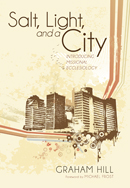
There are various paradigmatic ways to think about the church and the mission of Christ. All of these can help us to better understand the nature and mission of Christ’s church. If you are a deeply missional Christian you should get this point going into the conversation. Missional church theology believes that there is no single way, or theological paradigm, that fully expresses the whole truth about Christ’s people. Most serious ecumenists have come to recognize this through their shared experience, which is an extremely powerful way to encounter the living church that will take you far beyond books and ideas. I entered this process and conversation about twenty years ago. As I now understand the rise of the ecumenical movement in the twentieth century I now see each form of the church as a stream, or a mighty river. Each one flows from the truth of Christ about his one, holy, catholic and apostolic church. These streams, or great rivers, flow into our shared human experience of grace. If this shared (and experienced) ecclesiology is adopted, in some form, you can profitably draw from various Christian streams; e.g. Catholic, Orthodox, Protestant and free church. In order to create a rich and robust missional-ecumenical understanding of the church I believe we need an ecclesiology which is: “theologically reflective, mission forged, Christ-centered, Spirit-empowered, Trinity-imaging, gospel-shaped, cooperative and dialogical—for the glory of Christ Jesus our Lord” (Salt, Light, and a City: Introducing Missional Ecclesiology, Graham Hill. Eugene, Oregon: Wipf & Stock, 2012, 274),
One of the greatest problems that I encounter in trying to give this vision to others is in the two central words that I’ve chosen: missional and ecumenical. The term “missional church” is too often understood, as I noted, to be the latest fad in how to do church. In the aforementioned book, Salt, Light, and a City, Graham Hill reminds us that the missional church, when understood theologically, is a rich and needed development that demonstrates “ecclesiology is inconceivable without a Christ-centered missiology, and vice versa” (italics mine, 267). In this way of understanding the church exists for mission and a mission without the church is a movement without Christ’s communitas.
Let me elaborate briefly. God, as a trinity of persons, is by nature a missional creator and redeemer. He is a giving, sending, saving community of persons. And if we read scripture with a missional hermeneutic (i.e., an interpretative framework) then such work will instinctively lead us toward unity in Christ’s mission. To see the big picture is to see that God has a mission and he is accomplishing his mission in our world. This will always include the church. It is wonderful that we have begun to recover a right understanding of the kingdom of God, as we saw here a few weeks ago. But if we understand the kingdom, and forget the church, then we will very likely create an entirely new problem, one that I see unfolding daily in various reactions against the church, reactions that come from (mostly) burned out baby-boomers.
We have been granted the amazing privilege of joining with Christ in the renewal of all things but we cannot afford to leave the church out since God put it into the equation. Individualism is a serious error in the face of this biblical revelation. This type of emphasis only gives us a new form of gnosticism. We already have enough of that heresy floating around, in wildly popular forms, to set us back severely in our pursuit of Christ’s kingdom in the present “now” phase. God help us to get the kingdom right and then to never give up on the church, even in its most broken and weak expressions. The glory of Christ is that he has given this good news to a people who are always in need of grace and renewal themselves. Let us never forget this. And let us embrace the “missional church” in a way that seeks the unity of the visible church that Jesus actually prayed for in John 17.
Related Posts
Comments
My Latest Book!

Use Promo code UNITY for 40% discount!






John, you know I whole-heartedly embrace this view. May this increase and spread worldwide.